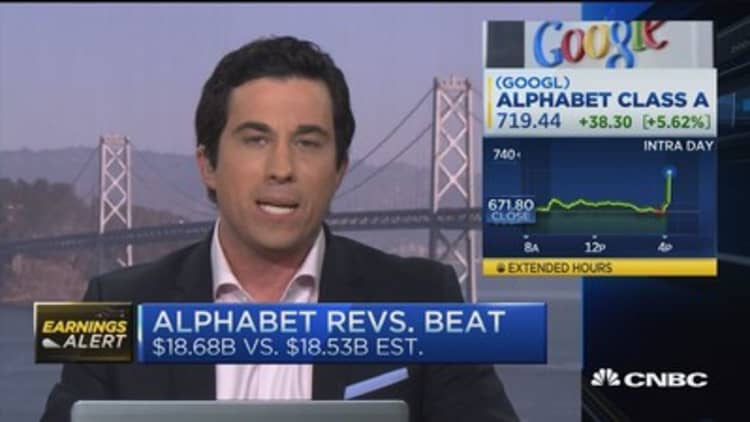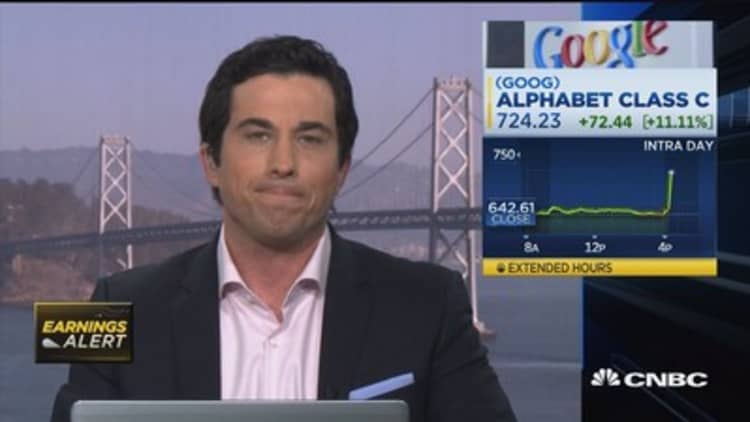


Alphabet, the successor to and new parent company of Google, reported Google's pre-reorganization third-quarter earnings and revenue results on Thursday.
The company beat on both the top and bottom lines with earnings of $7.35 per share on revenue of $18.68 billion. Analysts had expected Alphabet to report earnings of about $7.21 per share on $18.53 billion in revenue, according to a consensus estimate from Thomson Reuters.
Alphabet also announced that its board had authorized a repurchase of up to $5,099,019,513.59 in Class C capital stock (5.099019514 is the square root of 26 — the number of letters in the alphabet). Those shares, trading under the ticker GOOG, rose more than 11 percent in after-hours trade.
Class A shares in the company, meanwhile, jumped more than 9 percent in after-hours trading after the results were announced. With a current all-time high of $713.33, Alphabet shares above $740 would easily beat that record.
Chart source: Google results.
"Our Q3 results show the strength of Google's business, particularly in mobile search. With six products now having more than 1 billion users globally, we're excited about the opportunities ahead of Google, and across Alphabet," Ruth Porat, CFO of Alphabet and Google, said in the company's results announcement.
The company said it saw aggregate paid clicks grow 23 percent year-over-year — analysts had only expected 18.6 percent growth, according to StreetAccount. Aggregate cost-per-click, meanwhile, fell 11 percent year-over-year while Wall Street had estimated an 8 percent decrease.
Celebrating the growth of his unit's businesses, Google CEO Sundar Pichai said that those technologies are "just beginning to scratch the surface."
He offered a vision for the future wherein Google remains a "place of incredible creativity and innovation that uses our unique technical expertise to tackle big problems and create that future."
One such future plan includes Google's cloud strategy, which Pichai said is a "growing area where we see great opportunity." He said the company is seeing "tremendous" momentum in new customer adoption for that business.
But even in the present, Google is already topping expectations.
"We turned in a strong performance in the third quarter, not withstanding continue meaningful currency headwinds," Porat said during the company's earnings call. "The key highlight this quarter was the substantial growth of our mobile search revenue, complimented by ongoing strong contributions from YouTube and our programmatic business."
In fact, search traffic on mobile phones has already surpassed desktop traffic worldwide, Pichai said.
When asked about ad-blockers affecting Google's advertising revenues, Pichai said that those programs are "not a new phenomenon" but users are largely "okay with the contract" of seeing ads — as long as the experience works well.
Those currency "headwinds" from a strong U.S. dollar, she said, amounted to a $1.6 billion negative impact on revenues — $1.3 billion after the benefit of the company's hedging program. In fact, on a constant-currency basis, total revenue for the quarter grew 21 percent year-over-year (instead of the 13 percent reported).
The company's traffic acquisition costs (TAC) came in at $3.57 billion, topping average analyst estimates of $3.47 billion, according to StreetAccount.
Headcount for the company came in at 59,976 — a 16 percent increase from the same time last year. Cash, cash equivalents, and marketable securities, meanwhile, grew to nearly $73 billion from about $62 billion during the comparable year-ago period.
Google announced in August that it would institute a new corporate operating structure in which a new company called Alphabet would count the core Google businesses as a subsidiary. Shares trading under the tickers GOOGL and GOOG were converted to (different classes of) Alphabet stock.
Read MoreThe big costs behind Google's moonshot start-ups
The structure of the new company separates businesses like YouTube and search from units that oversaw self-driving cars and health products.
While the core Google unit continues to represent the primary component of the company's value, the other segments focusing on future businesses point to Alphabet's long-term potential.
The company was not expected to reveal the financial details of its non-core segments in its third-quarter report, but some analysts have worked to determine the magnitude of costs associated with these businesses.
Porat said on the earnings call that the company will break out Google and "other bets" in the fourth quarter. She said Alphabet will break out revenue, profitability and capital expenditures for both divisions.
"By doing this we expect that you will be better able to understand how we manage the businesses, including the pace and allocation of our investments," she said.


